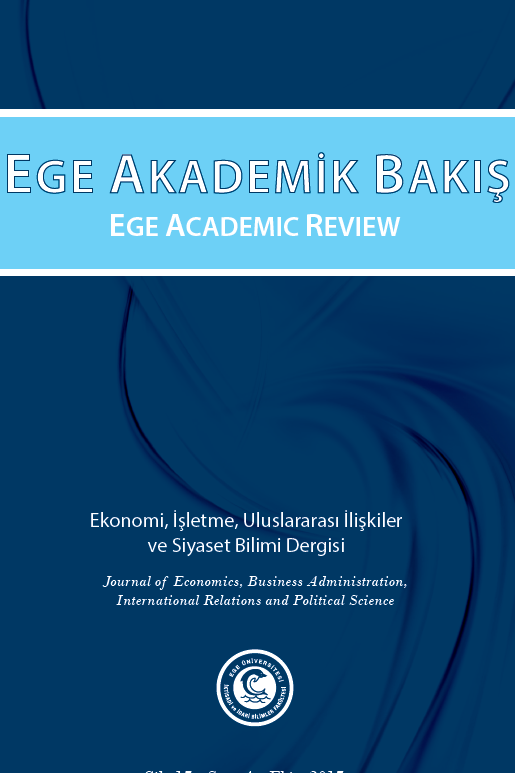BÖLGESEL YENİLİK SİSTEMLERİ VE DEVLETİN ROLÜ: TÜRKİYE’DEKİ KURUMSAL YAPI VE DEVLET ÜNİVERSİTELERİ
Bu çalışma, Türkiye’de devletin bölgesel yenilik sistemlerinde devlet üniversiteleri ve yasal ve kurumsal altyapı aracılığıyla oynadığı rolü incelemektedir. Yakın zamana kadar, bölgesel bakış açısının eksikliği tartışıldıktan sonra, bölgesel iktisat için önemli yansımaları bulunan iki önemli yasa üzerinde durulmaktadır. Teknoloji geliştirme bölgeleri ve merkezleri ile üniversite-sanayi ortak araştırma merkezleri ve devlet üniversiteleri, hem araştırma, hem de bu merkez ve bölgelerdeki ağırlıkları nedeniyle bölgesel yenilik sistemlerinin kilit öğeleri olarak ortaya çıkmaktadır. Bu çalışmandaki ekonometrik çözümleme, her bir öğenin bölgelerin yenilik performansı üzerinde olumlu ve istatistiksel olarak anlamlı bir rolünün olduğunu ortaya koymuştur.
This paper investigates the role of state played in the regional innovation systems through state universities and legal and institutional setup in Turkey. After a discussion of the lack of regional perspective in policy-making until very recently, the paper examines two salient laws that have ramifications for regional economics. Technology development regions/centers, university-industry joint research centers and state universities on account of public research undertaken in and their role in the mentioned centers/regions seem to be key elements in regional innovation systems. The econometric analysis forwarded that each of these elements has a positive and statistically significant effect on the patenting performance of regions
___
- ARELLANO, M. ve BOND, S. (1991): “Some Tests of Specification for Panel Data: Monte Carlo Evidence and an Application to Employment Equations”, Review of Economic Studies, 58, ss. 277-297.
- ARELLANO, M. ve BOVER, O. (1995): “Another Look at the Instrumental Variable Estimation of Error-Component Models”, Journal of Econometrics, 68, ss.29-52.
- ASHEIM, B. T ve COENEN, L. (2005): “Knowledge Bases and Regional Innovation Systems: Comparing Nordic Clusters”, Research Policy, 34, ss.1173-1190.
- BLUNDELL, R. ve BOND, S. (1998): “Initial Conditions and Moment Restrictions in Dynamic Panel Data Models”, Journal of Econometrics, 78(1), ss.115-143.
- COOKE, P. (2005): “Regionally Asymmetric Knowledge Capabilities and Open Innovation Exploring “Globalisation 2”- A new Model of Industry Organisation”, Research Policy, 34, ss.1128-1149.
- COOKE, P. (2004): “Regional Innovation Systems – An Evolutionary Approach”, Cooke et al. (eds.) Regional Innovation Systems 2nd Edition, London, Routledge.
- COOKE, P.; STEPHEN, R.; ve WYLIE, P. (2003): “Northern Ireland’s Evolving Regional Innovation System”, Regional Studies, 37.4, ss.365-379
- COOKE, P.; URANGA, M.G. ve EXTERBARRIA, G. (1997): “Regional Innovation Systems: Institutional and Organizational Dimensions”, Research Policy, 26, ss. 475-491.
- DULUPÇU, M. ve GÖVDERE, B. (2005): “Bölgesel Gelişme Stratejileri için Bir Perspektif: Yerel Bilgi Ağbağları Yaklaşımı”, Erlat, H. (ed), Bölgesel Gelişme Stratejileri ve Akdeniz Ekonomisi, (Ankara: Türkiye Ekonomi Kurumu).
- FREEMAN, C. (1987): Technology Policy and Economic Performance: Lessons from Japan, (London: Pinter)
- FREEMAN, C. (1988): “Japan: A New Institutional System of Innovation?” Dosi, G.; Freeman, C.; Nelson, R.; Silverberg, G. and Soete, L. (eds) Technical Change and Economic Theory, London and New York, Pinter.
- YÖK (2006): 2004 Yılında Tüm Üniversitelerde SCI+SSCI+AHCI’te Yayımlanan Yayınlara Göre Yayın Sıralaması, http:// www. yok. gov.tr/universiteler/uni_web.htm, (05.05.2006)
- KITAGAWA, F. (2004): “Universities and Regional Advantage: Higher Education and Innovation Policies in English Regions”, European Planning Studies, 12(6), ss. 835-852.
- KOSGEB (2006): Tekmer İşletme Bilgileri, http://www.kosgeb.gov.tr/Firmalar/Default.asp? Action=TEKMER (05.05.2006)
- LEVIN, A., LIN, C.F. ve C.S. Chu (2002): “Unit root tests in panel data: Asymptotic and finite sample properties”, Journal of Econometrics, 108, ss.1–24.
- LUNDVALL, B-Å (1988): “Innovation as an Interactive Process: From User-Producer Interaction to National Systems of Innovation”, Dosi, G.; Freeman, C.; Nelson, R.; Silverberg, G. and Soete, L., Technological Change and Economic Theory, London and New York, Pinter.
- LUNDVALL, B-Å. (1992): “Introduction”, Lundvall, B.A. (ed) National Systems of Innovation: towards a theory of innovation and interactive learning, London, Pinter.
- NELSON, Richard R. (1988): “Institutions Supporting Technical Change in the United States” Technological Change and Economic Theory, Dosi, G.; Freeman, C.; Nelson, R.; Silverberg, G. and Soete, L., Technological Change and Economic Theory, London and New York, Pinter.
- NELSON, R. (1993): National Innovation Systems: A Comparative Analysis, (New York: Oxford University Press).
- NELSON, R. ve Rosenberg, N. (1993): “Technical Innovation and National Systems”, National Innovation Systems: A Comparative Analysis, Nelson, R. (Ed.), (New York: Oxford University Press).
- PEKSEN, Z. (2001): “Ulusal Yenilik Sistemi: Kurumsal Yapı”, in Taymaz, E. (2001) Ulusal Yenilik Sistemi: Türkiye İmalat Sanayiinde Teknolojik Değişim ve Yenilik Süreçleri, (Ankara:TÜBİTAK/TTGV/DİE), ss. 277-329.
- ROODMAN, D. (2005): xtabond2: Stata Module to Extend xtabond Dynamic Panel Data Estimator, Center for Global Development, Washington, http://econpapers.repec.org/software/bocbocode/s43 5901.htm (01.05.2006)
- TAYMAZ, E. (2001): Ulusal Yenilik Sistemi: Turkiye İmalat Sanayiinde Teknolojik Değisim ve Yenilik Süreçleri, Ankara, TÜBİTAK/TTGV/DİE TBMM (2001): The Law about the
- Establishment, Coordination and Tasks of Regional Development Agencies, No. 5449, http://www.tbmm.gov.tr/kanunlar/ k5449.html (05.05.2006)TBMM (2006): The Law of Technology Development Regions, No. 4691, http://www.tbmm.gov.tr/kanunlar/ k4691.html, (05.05.2006)
- Teknonet (2006): Teknoloji Geliştirme Merkezleri,http://www.teknonet.org.tr/index.ph p?pageID=main&lang=tr, (05.05.2006).
- TUBITAK (2006): http://www.tubitak.gov.tr/ hakkimizda/2004/ek7/EK_7.pdf, (05.05.2006).
- Türk Patent Enstitüsü (2006): Patent İstatistikleri,http://www.turkpatent.gov.tr/dosyal ar/istatistik/patent/PFMSehir.pdf (05.05.2006).
- TÜİK (2000), İmalat Sanayi İstatistikleri, Ankara.
- ISSN: 1303-099X
- Yayın Aralığı: Yılda 4 Sayı
- Başlangıç: 2000
- Yayıncı: Ege Üniversitesi
Sayıdaki Diğer Makaleler
SÜREKLİ KAMUYU AYDINLATMA VE İNTERNET ORTAMINDA FİNANSAL RAPORLAMA SÜRECİNDE KULLANILAN DİLLER
BÖLGESEL YENİLİK SİSTEMLERİ VE DEVLETİN ROLÜ: TÜRKİYE’DEKİ KURUMSAL YAPI VE DEVLET ÜNİVERSİTELERİ
WHY EUROPEAN UNION IS NOT AN OPTIMAL CURRENCY AREA: THE LIMITS OF INTEGRATION
AVRUPA KONSEYİ SÖZLEŞME VE ŞARTLARININ AVRUPA BİRLİĞİ KOPENHAG KRİTERLERİNE GÖRE DEĞERLENDİRİLMESİ
